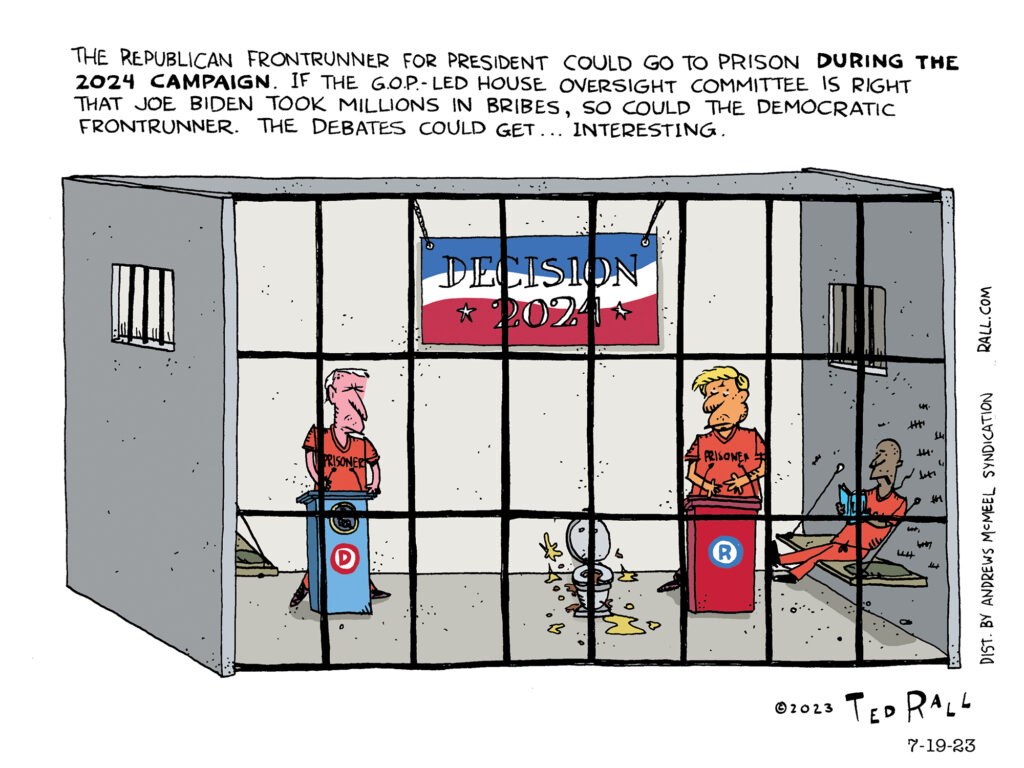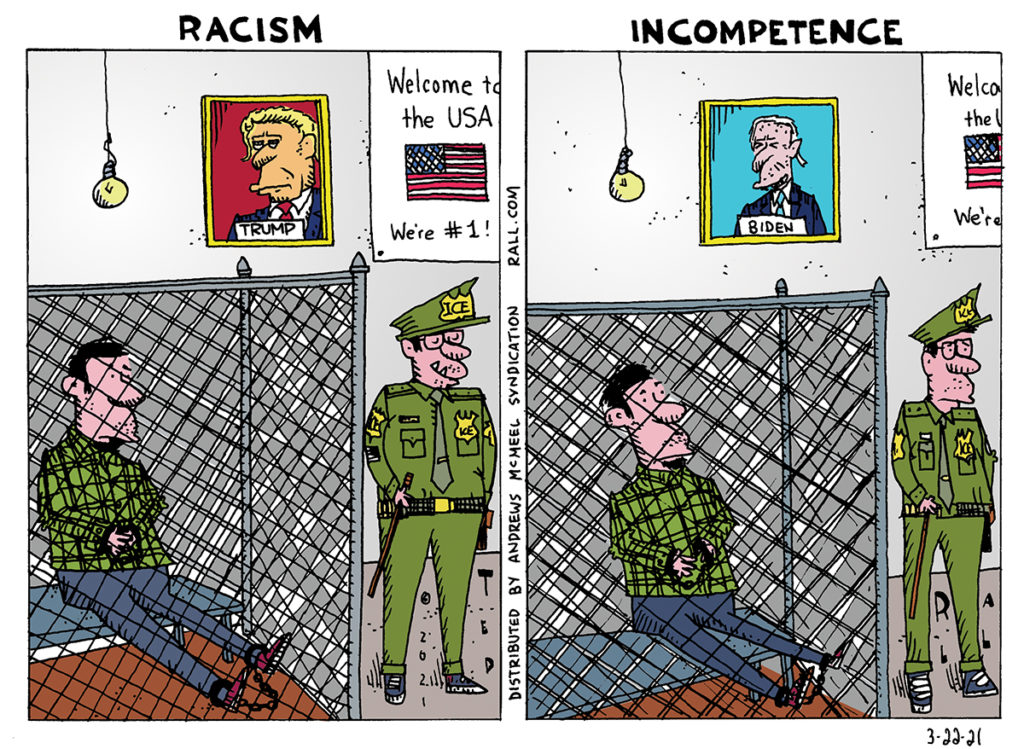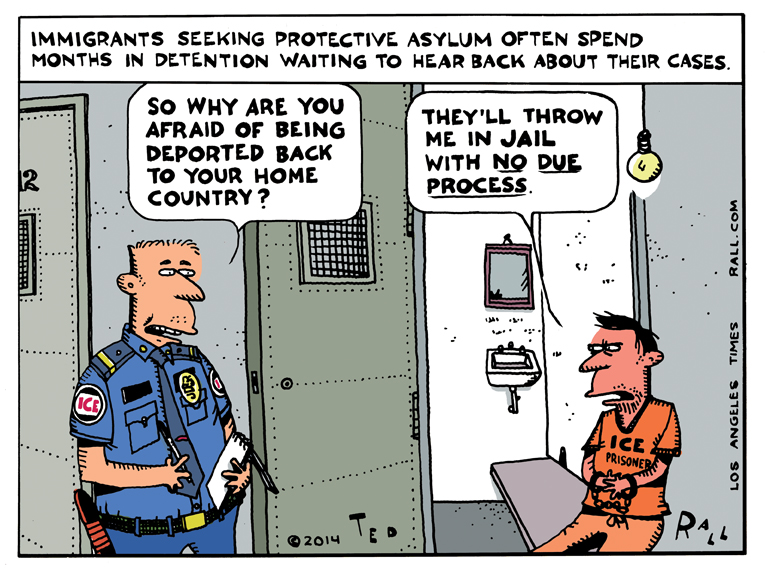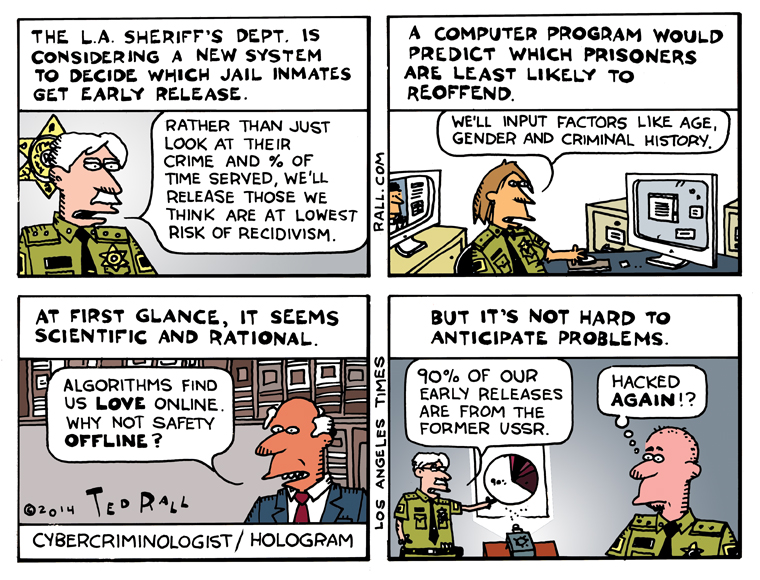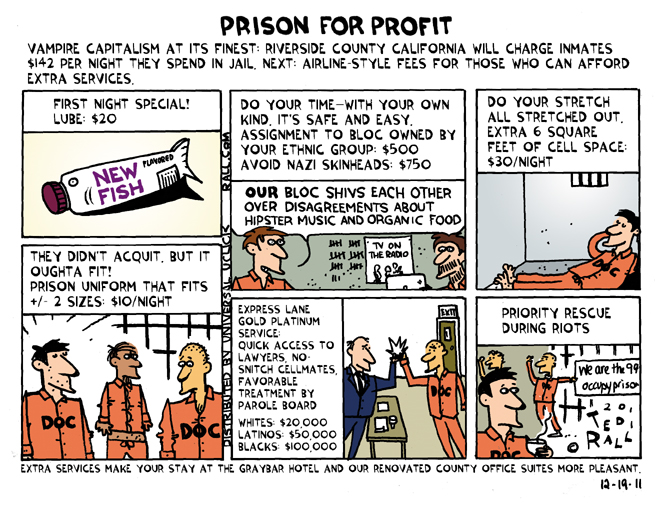The Republican frontrunner for president could go to prison during the 2024 campaign. If the G.O.P.-led House Oversight Committee is right that Joe Biden took millions in bribes, so could the Democratic frontrunner. The debates could get…interesting.
Pick One Box
Facing multiple criminal indictments, Republican frontrunner Donald Trump might be in prison by election day 2024. Joe Biden, the Democratic incumbent and party frontrunner, is currently older than 96% of all Americans, a number that will only become bleaker by next year. It’s hard to argue that American democracy is alive and well. Which box will you choose?
Biden’s “Defense”: I’m Not Racist, I’m Inept
Experts on site at the southern border with Mexico repeatedly warned the incoming Joe Biden administration that they should expect a surge of migration coinciding with the new presidency. Apparently it happens every 4 to 8 years. But Biden ignored them. As a result, thousands of people are arriving without adequate facilities to house them, and they are being held in the scandalous dog cages used by the Trump administration.
LOS ANGELES TIMES CARTOON: Waiting for Due Process
After 9/11, they said, irony was dead.
Someone should tell the immigration bureaucrats.
A lawsuit filed by the ACLU and an immigrants’ advocacy organization cites government data that shows that the average wait time for a “reasonable fear determination” is 111 days. (For the chronologically challenged, that’s nearly four months.)
America may the land of the free and the brave, and Lady Liberty may welcome the tired, poor huddled masses. But if you’re exactly the type of immigrant who most needs to get in — a person fleeing a tyrannical homeland whose government goons want to torture you, kill you, or torture you and then kill you — the U.S. government doesn’t welcome you with open arms.
First, they lock you in detention. In other words, prison. Bad prison. The kind of hellhole where, according to an ACLU report, rape is among an epidemic litany of horrors, alongside medical and psychological abuse. (For some reason, the guy who died of treatable penile cancer — the feds didn’t treat him, but they did issue him an extra ration of boxer shorts before he croaked — sticks in my memory.)
There are three ways out of immigration prison.
First: deportation back to the motherland.
Second: death.
Third: United States Citizenship and Immigration Services, a division of the Department of Homeland Security, grants you asylum.
“A person applying for asylum must prove that he or she has a fear of persecution in their country of nationality that is well-founded because of their race, religion, nationality, social group or political opinion,” according to the government. The magic ticket to asylum, and release into the sweet fresh air of American liberty, is a “reasonable fear determination.” (The “fear” refers to your fear of being tortured or killed because the government back home is out to get you, or is powerless or unwilling to stop private the bad guys — a drug cartel, for example — who are after you. The “reasonable” means that you’re not just paranoid, that they really are out to get you.)
A reasonable fear determination, as we’ve said, takes four months. Sometimes less. Sometimes longer.
ACLU lawsuit aside, there’s something more than a little, um, ironic about these delays. As Kate Linthicum reports in The Times, regulations say that asylum seekers are entitled to get their yeas and nays within 10 days. Which, considering that thing about rape and penile cancer, seems plenty long as it is.
Just an aside, but doesn’t it seem a little strange — OK, totally wack — that we throw political dissidents, women running away from female circumcision, people who have lost everything but the clothes on their backs — into prison? Even if it is for “just” 10 days…much less four months? You only get one chance to make a good first impression. Why not put them up in hotels instead?
The current system at a glance: welcome to the United States of America! Sorry you got raped. Oh, and did you hear about our unemployment rate?
Still not convinced America is a downright mean country to asylum seekers? Consider this: Germany — you know, the country where Hitler came from — pays applicants for asylum while they’re waiting to hear about their requests to stay.
Maybe it’s time to send Mme. Liberté back to France.
LOS ANGELES TIMES CARTOON: RoboSheriff
Computer algorithms drive online dating sites that promise to hook you up with a compatible mate. They help retailers suggest that, because you liked this book or that movie, you’ll probably be into this music. So it was probably inevitable that programs based on predictive algorithms would be sold to law enforcement agencies on the pitch that they’ll make society safe.
The LAPD feeds crime data into PredPol, which then spits out a report predicting — reportedly with impressive accuracy — where “property crimes specifically, burglaries and car break-ins and thefts are statistically more likely to happen.” The idea is, if cops spend more time in these high-crime spots, they can stop crime before it happens.
Chicago police used predictive algorithms designed by an Illinois Institute of Technology engineer to create a 400-suspect “heat list” of “people in the city of Chicago supposedly most likely to be involved in violent crime.” Surprisingly, of these Chicagoans — who receive personal visits from high-ranking cops telling them that they’re being watched — have never committed a violent crime themselves. But their friends have, and that can be enough.
In other words, today’s not-so-bad guys may be tomorrow’s worst guys ever.
But math can also be used to guess which among yesterday’s bad guys are least likely to reoffend. Never mind what they did in the past. What will they do from now on? California prison officials, under constant pressure to reduce overcrowding, want to limit early releases to the inmates most likely to walk the straight and narrow.
Toward that end, Times’ Abby Sewell and Jack Leonard report that the L.A. Sheriff’s Department is considering changing its current evaluation system for early releases of inmates to one based on algorithms:
Supporters argue the change would help select inmates for early release who are less likely to commit new crimes. But it might also raise some eyebrows. An older offender convicted of a single serious crime, such as child molestation, might be labeled lower-risk than a younger inmate with numerous property and drug convictions.
The Sheriff’s Department is planning to present a proposal for a “risk-based” release system to the Board of Supervisors.
“That’s the smart way to do it,” interim Sheriff John L. Scott said. “I think the percentage [system, which currently determines when inmates get released by looking at the seriousness of their most recent offense and the percentage of their sentence they have already served] leaves a lot to be desired.”
Washington state uses a similar system, which has a 70% accuracy rate. “A follow-up study…found that about 47% of inmates in the highest-risk group returned to prison within three years, while 10% of those labeled low-risk did.”
No one knows which ex-cons will reoffend — sometimes not even the recidivist himself or herself. No matter how we decide which prisoners walk free before their end of their sentences, whether it’s a judgment call rendered by corrections officials generated by algorithms, it comes down to human beings guessing what other human beings do. Behind every high-tech solution, after all, are programmers and analysts who are all too human. Even if that 70% accuracy rate improves, some prisoners who have been rehabilitated and ought to have been released will languish behind bars while others, dangerous despite best guesses, will go out to kill, maim and rob.
If the Sheriff’s Department moves forward with predictive algorithmic analysis, they’ll be exchanging one set of problems for another.
Technology is morally neutral. It’s what we do with it that makes a difference.
That, and how many Russian hackers manage to game the system.
(Ted Rall, cartoonist for The Times, is also a nationally syndicated opinion columnist and author. His new book is Silk Road to Ruin: Why Central Asia is the New Middle East.)
The Ultimate Crime
Congress is investigating to find out who leaked the story that Obama has a secret “kill list” of political assassination targets, and that the U.S. conspired with Israel to infect Iran with the Stuxnet computer virus, to the New York Times. Shouldn’t they be investigating those activities, which are crimes, instead?

